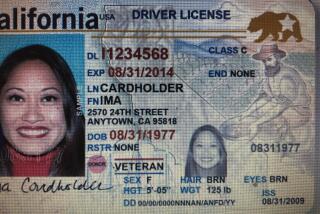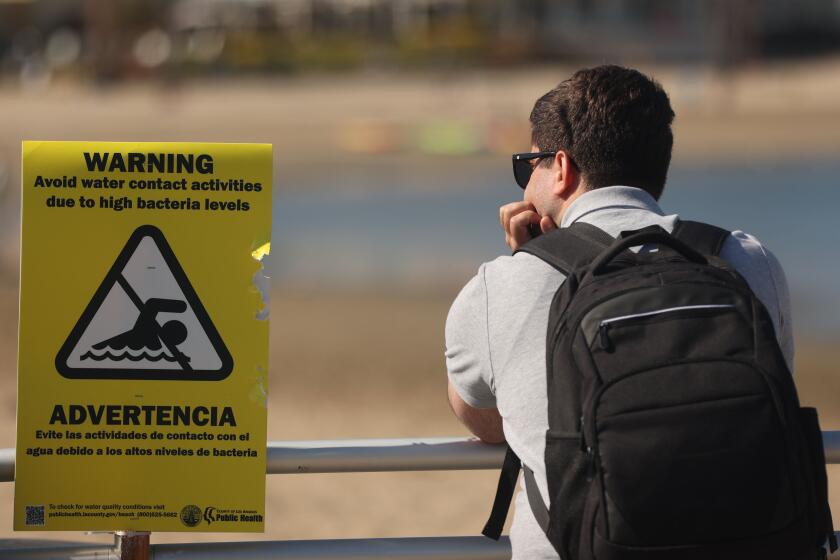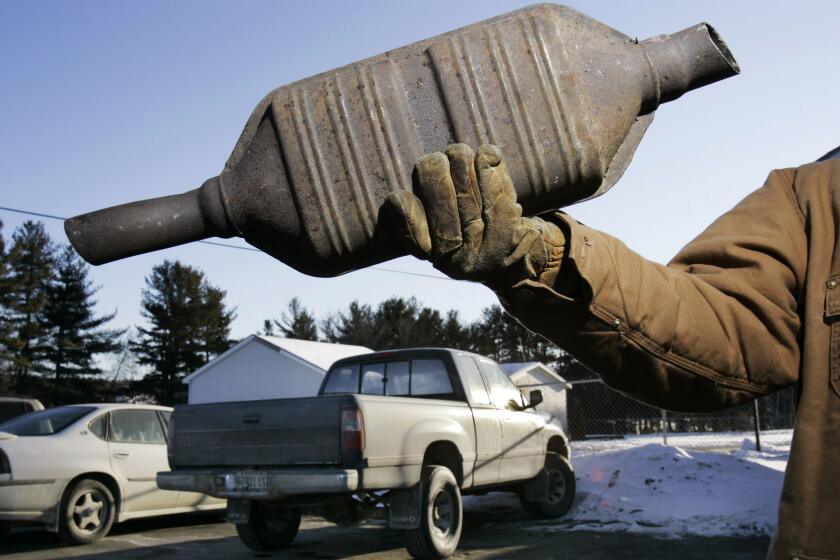Lawyer Sought Out the Blake Jury’s Soft Side
In the biggest trial of his legal career, Eric J. Dubin began his closing argument by apologizing to the jury.
If his questions sounded confusing, his objections seemed inopportune or his loud sighs and rolling eyeballs came off like theatrical stunts, he said, please don’t hold it against his clients.
Representing the family of Bonny Lee Bakley in the wrongful-death lawsuit against actor Robert Blake, Dubin wasn’t absolutely sure he was winning what some critics viewed as, at best, a disjointed case.
So he reached for the jury’s soft side -- and found it.
On Nov. 18, the Burbank jury awarded Bakley’s four surviving children a $30-million judgment against Blake, who had been acquitted of murder in a Van Nuys criminal trial in March. Members of the civil panel said it was Dubin’s apology that helped give him credibility.
The attorney’s ability to connect was surprising given how the 39-year-old solo practitioner from Orange County had been viewed during jury selection.
Several potential panelists openly said he looked like a lawyer trying to line his pockets and those of the Bakley family at Blake’s expense.
The ending was all the more improbable, according to lawyers familiar with the case, because the idiosyncratic Dubin was up against a far more seasoned opponent, defense lawyer Peter Q. Ezzell, a 30-year litigator who in 150 jury trials had lost only five.
“It wasn’t a fair match as far as lawyering skills go,” said attorney Cary W. Goldstein, who represented the Bakley family before Dubin picked up the case. “But Dubin’s lack of finesse may have worked to his clients’ advantage, in that it may have evoked sympathy from the jury. The jury wanted to help. It wasn’t about the lawyers, it was about the facts of the case.”
In many ways, however, the civil trial reflected the unorthodox quality of Dubin’s legal career, cultivated by hustle, chutzpah and, critics contend, a boundless thirst for self-promotion.
The attorney said his interest in the law was sparked by a field trip to the Detroit criminal courts from his middle school in Southfield, Mich.
He recalled intense arguments during a murder trial that ended with friendly exchanges -- and laughter -- between the prosecutor and defense attorney.
“It was like sports, where you could do your best but be friendly, be a human being,” Dubin said. “That was my first taste of professionalism, and I liked it.”
There was little of that esprit de corps during the Blake case, however, as the actor’s defense attorneys openly displayed contempt for Dubin’s lawyering.
“Having spoken to a number of people present during the trial and having listened to the statements of the jurors, it’s clear that the civil verdict was rendered despite Mr. Dubin, not because of him,” said M. Gerald Schwartzbach, who successfully defended Blake against the criminal charges.
Bakley was found dying in her husband’s car May 4, 2001, shortly after the two had dined at Vitello’s restaurant in Studio City. Blake told authorities he had left her while he returned to the restaurant to retrieve a revolver he had forgotten in a booth.
When he got back to the car, she had been shot, he said.
“Mr. Dubin’s conduct during both the criminal and civil trials is evidence that he is consumed by the desire for public attention,” Schwartzbach said.
Dubin, who attended the criminal trial almost every day and was a fixture on newscasts and cable television shows, sloughed off the criticism as sour grapes.
“We’ve gone 12 rounds,” he said, “and there is a clear winner.”
Dubin, who came west to attend the University of Arizona and California Western School of Law, began his career at a large downtown Los Angeles firm taking hundreds of depositions -- asking questions of witnesses who are under oath -- in cases in which he defended businesses and individuals.
A turning point came when he attended the trial school of famed defense attorney Gerry L. Spence.
Spence’s best advice to the group, Dubin said, was “that being completely honest” and willing “to expose your flaws to a jury can be extremely powerful. If you want people to open up to you, you have to open up to them.”
The experience gave Dubin the confidence to strike out on his own.
In 1996, less than five years out of law school and with $5,000 in the bank, he opened his own firm in Irvine.
He handled personal injury cases but began to gain a public persona when he landed on a legal advice radio show that aired for about a year.
Margerry Bakley was having a bout of insomnia when she tuned in to Dubin’s 6 a.m. program in June 2002, a couple of months after Blake had been charged with the murder of her sister Bonny, who had had daughter Rose with the actor and later married him.
Dubin said to the audience, “ ‘Give me a call if you have a case,’ ” Margerry Bakley recalled. “I thought, ‘He sounds young, eager and aggressive and he’s up at 6 a.m.’ I liked that.”
Her first choice to represent her sister’s children in the civil case had been O.J. Simpson co-counsel Robert Shapiro, Dubin said. But Shapiro had a conflict because at one time he had represented Christian Brando, a former lover of Bonny Lee Bakley and eventually a witness in the civil case.
Margerry Bakley said that she had grown suspicious of the Los Angeles legal community and that Dubin was from “out of town.”
By taking the case, the attorney admitted, he “rolled the dice” with his practice and reputation. But he said the reward has been worth it.
During the criminal and civil proceedings, Margerry Bakley said, even she had her ups and downs with Dubin. He came to earn her trust and respect, however, for being “empathetic, sympathetic and really good with the kids,” she said, referring to Bonny’s adult children, Holly and Glenn Gawron. Daughters Rose Blake and Jerri Lee Lewis were the other plaintiffs.
Early on, Dubin also fell back on a familiar skill, taking to the airwaves daily on local news broadcasts and cable shows trying to provide a counterpunch to pretrial publicity that branded the mother of his clients a grifter.
Ultimately, a criminal court jury acquitted Blake, citing the prosecution’s inability to put the gun in his hand.
But Dubin said he didn’t need to do that. Unlike in a criminal trial, where guilt must be proved beyond a reasonable doubt, a civil court jury can find against a defendant if there is simply a preponderance of evidence against him.
So Dubin said he sought to build a case based on “the numerous contradictions” in Blake’s statements to police, in his civil deposition and in testimony before the Burbank jury.
Dubin was also able to show the jury that the former actor was capable of exhibiting uncontrolled anger along with charm.
During his trial testimony, Blake yelled at Dubin, derisively called him “sonny,” “chief” and “champ,” and even threatened that after the case was done somebody would “teach him some manners.”
That performance by the Emmy Award-winning star of “Baretta” earned a thumbs down from jurors who later called him “unprofessional” and his “own worst enemy.”
Some also said they were turned off by Ezzell’s closing statement, in which the lawyer said the Bakley children’s loss of their mother’s love and guidance had no monetary value.
In perhaps the most dramatic moment of the trial, Dubin responded by writing each child’s name on a blank flip chart and putting a zero beside each one. Then inside the circles he wrote “love.”
A mother who loves her children, he said, is not worthless. “Nobody is a zero.”
*
(BEGIN TEXT OF INFOBOX)
The winner is ...
* During college at the University of Arizona in Tucson, Eric J. Dubin worked as a copy machine salesman. Wearing a suit on 110-degree summer days, he said, was all the inducement needed to continue his education.
* The son of a construction worker and a homemaker, Dubin grew up the youngest of two boys in Southfield, Mich. He is married and has two children. His brother is an accountant in Chicago.
* Dubin said he fell in love with California while visiting a friend in the San Fernando Valley in the mid-1980s. On that trip, he took in a Bruce Springsteen show at the Los Angeles Memorial Coliseum during the “Born in the U.S.A.” tour.
More to Read
Start your day right
Sign up for Essential California for news, features and recommendations from the L.A. Times and beyond in your inbox six days a week.
You may occasionally receive promotional content from the Los Angeles Times.






